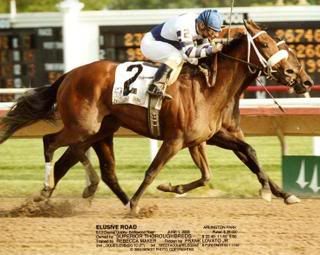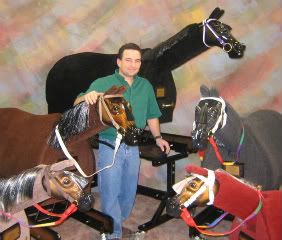By Frank Lovato Jr (to appear in Horses Magazine October 2008)
My name is Frank Lovato and I am a retired professional jockey. Over my 25 year career, I rode in over 15,000 races and had 1,680 winners. What may be even more interesting is that I build horses for people to ride indoors! I named them the Equicizer and they are playing a very serious role in many people's lives. Maybe you are you thinking, "Why in the world would anyone want or need a mechanical horse for in their home?" You may be surprised to learn why and who is riding off into the sunset right in their own living rooms these days.

Jockey Frank Lovato Jr (photo)
People of all ages are using them to exercise, train and use for therapy. It does not look like a robot horse or anything like that. I handcraft each of them so they're more like nicely finished, friendly pieces of furniture – but they're horses! This all may sound new to you and a bit crazy, but this is something I have been working on for many years. If you are still not quite sure what this is all about, please allow me the opportunity to explain this new world that I have created and why riding a horse inside your home can be a very amazing and beneficial experience!

Frank Lovato with his horses, the Equicizer & Equipony
This all started for me in 1981 when I sustained a severe injury from a racing accident. The concept of me needing a mechanical horse became very real for me as a means to rehabilitate myself back to health. I was completely crippled and had to learn how to walk again. During my rehabilitation process, there were plenty of fancy and expensive state of the art exercise machines available at the rehabilitation centers – but NONE would help me regain the strength, fitness, and flexibility I would need to ride a horse again. It was then I devised myself a mechanical horse made from wood and springs that gave me the real essentials of a horse. With this wooden horse, I was able to bridle, saddle up, and ride, recreating the moves, rhythm, and balance as if I was on a real horse without any risk or danger. The success of my rehabilitation and recovery using my wooden mechanical horse was phenomenal and immediately recognized by other world top jockeys who would ask me to please build them one. Over the next few years since building my first horse for myself, more and more request for my wooden horses kept coming and I kept building. In 1988, I officially named my wooden mechanical horses the Equicizer and created a child size version named the Equipony. This was also the time when my wife Sandy and I established our special company, The Wooden Horse Corporation.

Hall Of Fame jockey Mike Smith works out on the Equicizer
I am sure you are wondering how the Equicizer works and what makes it go. The answer is "you, the rider" make it go! I purposely designed them to not be motorized. My priorities have been for these horses to remain safe, to be affordable, and to be an exercise machine that does not need maintenance or electricity. The Equicizer is completely balanced on springs and it rests in the position of a typical horse in the standing position. It can be ridden bareback or with a standard saddle of any kind, and it is built to hold up to 500 pounds.
So what makes the Equicizer move? When the rider seated on the Equicizer pushes and tilts their hips forward in a rhythmic manner, this puts the Equicizer into motion. Gently riding in this manner will create the sensation of a horse walking. If you were to watch a rider's seat on a real horse while the horse was walking, you would see that forward rhythmic movement in the rider's hips. The only difference is that a real horse is doing the work for you.
This exercise on the Equicizer can be compared to the "pelvic thrust" exercise which is an abdominal core exercise that a chiropractor may recommend for you. The more energy and effort you put into this rhythmic exercise, the faster the Equicizer will go on up to a full canter. You can push with your seat and hips into the saddle the same way you would drive a real horse forward in a canter. As long as you maintain rhythm and good balance, the Equicizer will move properly and come to life. If you break the rhythm or halt, the Equicizer will stop right with you to keep you safe.

You do not have to ride the Equicizer fast to gain good healthy exercise. Being able to ride it slow and gently is why it enables people of all ages and level of abilities to ride and exercise. This is what makes the Equicizer extra special as people with injuries or disabilities that may not be able to use traditional exercise equipment can ride the Equicizer!
The simple exercise of pushing with your hips offers an amazing safe core, abdomen, back, and leg exercise for anyone – specifically for horse riders – to work those muscles you so importantly need to ride a horse.
Another exercise that is mostly used by jockeys is the two point position, where the rider stands up in the stirrups with their butts off the saddle and uses their arms pushing into the Equicizer's neck in rhythmic manner and stride. This exercise uses a whole different set of muscle groups and can build up a cardio exercise much faster Either way, exercising in or out of the saddle, the Equicizer can go as fast and as long as the rider can ride it. The Equicizer never gets tired, the riders do!

Exercise for the Equestrian
I don't think anyone would argue that there should be something for horse riders to exercise and train on for "riding horses." If you were a cyclist, I am certain you would have a stationary bike in your home. If you are a horse rider, why not have a stationary horse?! Treadmills, exercise bikes, and other exercise machines, offer great exercise, but they do not work your core and the important muscles you need specifically to ride a horse. After all, horse riders are athletes too! All other athletes have a means to train and practice their skills. Baseball players have batting cages, boxers have punching bags, golfers have driving ranges, you can have a basketball hoop in your driveway, etc., etc. Horse riders? I have an Equicizer. It just makes sense!
Over the past 20 years, I have built horses for riders of every kind, ranging from the professional extreme Equine athletes to small children and adults with disabilities. The Equicizer has reached all parts of the world. Aside from private homes, some of our customers include colleges, equestrians centers, riding instructors, clinicians, therapeutic riding programs, hippotherapy and rehabilitation centers, hospitals, and museums. No matter where their locations or purpose, they have found a need for the Equicizer and Equipony. Even the film industry has used the Equicizer for training actor Tobey Maquire to ride a horses and for the close up scenes in the making of Seabiscuit. The Equicizer was also used in Who's Your Caddy and ABC Family Channel's hit television series Wild Fire. All for the reason to capture close up scenes with the actors riding a horse while they were actually safely riding the Equicizer.

Actor Tobey Maguire Aboard the Equicizer in Seabiscuit
 Jesse Howell & Sheryl Sabino with "Cocoa Bear" their Equicizer - Founders of "Change Through Chance" therapeutic riding program of Wooster Ohio dedicated to helping those with physical and mental challenges.
Jesse Howell & Sheryl Sabino with "Cocoa Bear" their Equicizer - Founders of "Change Through Chance" therapeutic riding program of Wooster Ohio dedicated to helping those with physical and mental challenges.
www.ChangeThroughChance.org
We are a very small personal company, but I do believe in the need for such a product and the service the Equicizers provides. I still hand-craft each of my horses personally in my own private shop in Norwalk, Ohio. I take a lot of pride in the quality and craftsmanship of each horse, from nose to tail. Made mostly of wood and padded carpet, I carve and hand-paint the horse heads myself – something a little extra special that many people love. The manes and tails are very life-like, but I make those from a synthetic material. I dye and mix in various colors. I try to personalize the horses for the customers as much as possible when they request it with colors, markings, or personalized name plates, as most people do have fun with it along with the idea of it being a serious exercise machine. It may likely be the only exercise machine you may offer a pat on the neck or a kiss on the muzzle after a workout! I bet all of my customers would admit that one time or another they have had a word or two with their Equicizer! All part of the great fun! When was the last time you hugged your treadmill?

Lovato,
Carving Horse Heads

Hand Painted & Finished
My wife Sandy and I have been avid horse riders all our lives and she has two horses. One is her quarter horse gelding named "Raleigh" and the other is our Equicizer named "Mocha". Mocha is parked right in front of the TV in our living room while Raleigh, of course, is down at the barn. Sandy actually got her hero, RFD-TV's and master horseman Craig Cameron to autograph Mocha's cheek, but still, Raleigh is Sandy's true love and there is nothing Sandy would rather do than to ride Raleigh every waking moment. There are days that riding Raleigh just becomes impossible for Sandy with our kids, schedules, work, weather, etc. When she does get to ride Raleigh, though, she feels great in the saddle. The reason why is when she can't ride Raleigh, she's riding Mocha while watching her favorite TV shows like Gray's Anatomy or Craig Cameron on RFD-TV!

(photo above) Master horseman/clinician Craig Cameron with Steve Lantvit of Highgrove Farm in LaPorte, Indiana ,and Frank Lovato standing with Jazz, the Equicizer www.CraigCameron.com - HighGroveFarm.com
Wishing everyone happy trails, even if they may be right in your living room!
For more information, please contact Frank or Sandy Lovato; Phone: 419-663-1472 Email:Equicizer@aol.com
visit our website: www.Equicizer.com
Also: www.ExerciseHorse.com

Video above, RFD-TV's Craig Cameron interviews Lovato for his segment called "tack tip" at the 2008 Equine Affaire in Columbus, Ohio.



